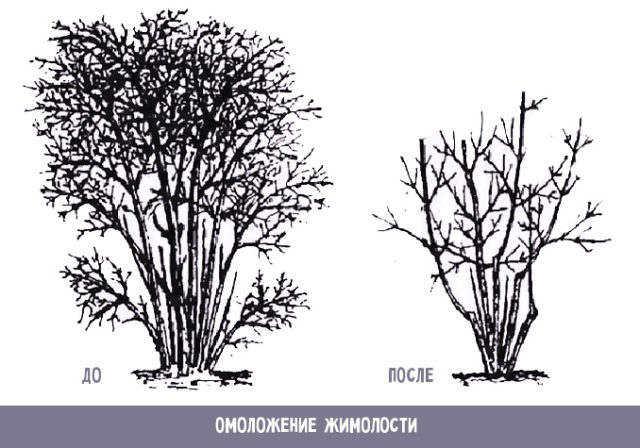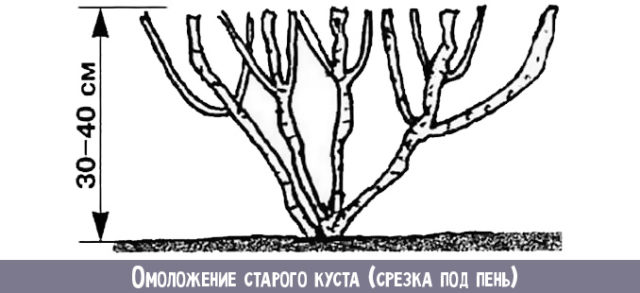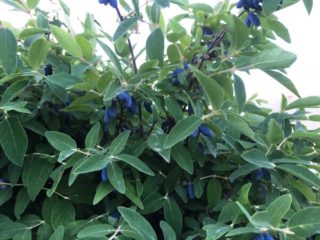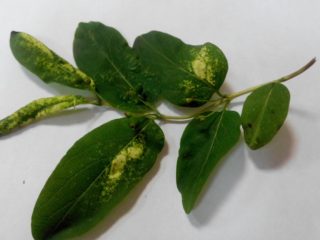Content
It is necessary to prune honeysuckle in the spring if this procedure was not done in the fall. Without pruning, the shrub loses its decorative effect, fruiting worsens. However, the problem is the fact that the plant wakes up early in the spring. If you do not guess with the timing, then the procedure will cause severe injuries to the bush.
Do I need to prune honeysuckle in spring
By itself, honeysuckle is unpretentious to care for. This is even evidenced by the reviews of many gardeners. It can be decorative and edible. The bushes usually grow up to 1.5 m in height. They make a beautiful green hedge. However, for all types of crops, pruning is necessary. The intensity of the event is related to the nutritional value of the soil on which the honeysuckle grows, as well as the frequency of watering.
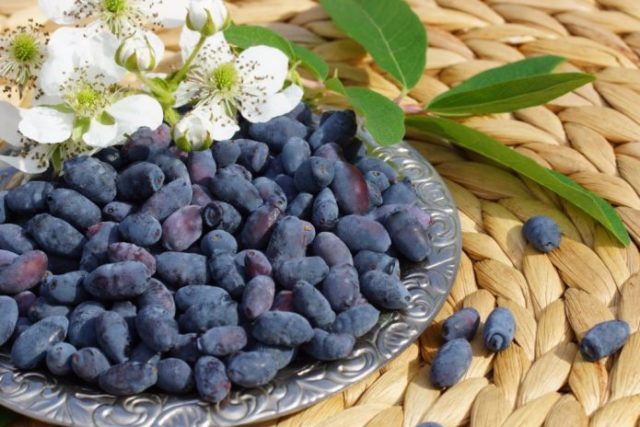
Pruning is needed to get a large harvest of large berries.
To get a good harvest, honeysuckle is abundantly fed and watered. With a lack of moisture and nutrients, the berries become smaller, they become smaller every year. However, water and top dressing stimulate the growth of the branches. Over time, the bush becomes very thickened. If it is not cut off, the same problem will reappear. Few berries will grow, and they will all be small.
When growing honeysuckle for the sake of decorativeness for a green hedge, pruning is done less often. The procedure helps to form bushes. You cannot completely do without cropping. From thickening, the shrub will lose its decorative effect. A lot of dry foliage, broken branches will appear.
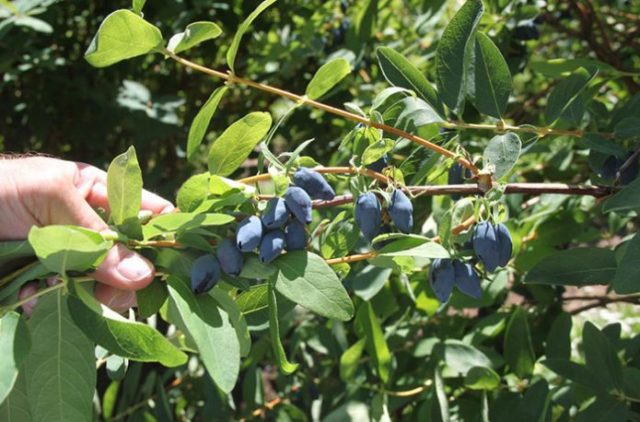
To properly prune the honeysuckle shrub, you need to know where the fruit buds are located on the branches.
For correct pruning of honeysuckle in spring, you need to know the location of the fruit buds. At the bottom of all branches there are growth buds. They can often be solitary. From the middle to the top of the branches, buds are located, giving shoots and flowers. In the first and second year of the seedling's life, the apical bud gives rise and usually dies off. On the new branch, lateral shoots grow from the buds located above and below. Skeletal branches are formed from them in the future.
In summing up, it remains to find out the benefits of pruning:
- The procedure promotes the thinning of the bush. Sunlight and fresh air flows into the crown. The berries gain sweetness, become larger, and the amount of ovary increases.
- A non-thickened bush gives a powerful growth faster. All skeletal branches will grow straight, pointing up towards the sunlight.
- It is more convenient to harvest on a well-groomed shrub.
There is no doubt about the need for pruning. Whether the procedure can be done in spring is another question. This is usually done in the fall. In the spring, gardeners carry out only sanitary pruning. Remove frozen or damaged branches. If in the fall it was not possible to form a crown, then this work will have to be done with the onset of warmth. It is only important to correctly guess the timing.
In the video how to prune honeysuckle in spring:
Timing of spring pruning of honeysuckle
With the arrival of warm days, honeysuckle begins to grow early. The buds may begin to swell while there is still snow.At this time, it is already too late to do the pruning. But early spring with frost is not the best time for the procedure. It is desirable that a stable temperature above zero is established outside. For most cool regions, this period occurs in March.
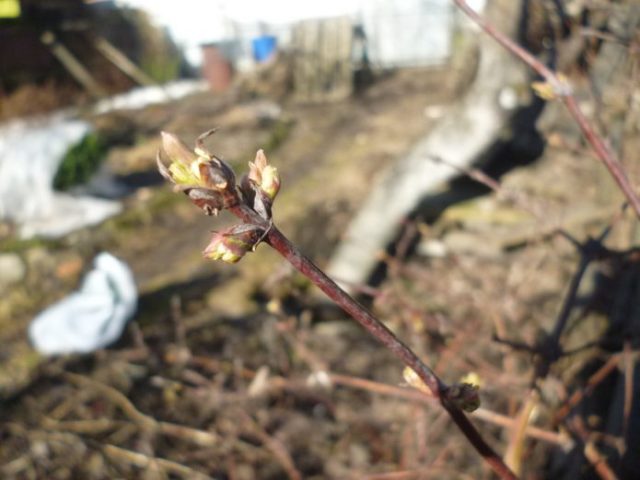
You can not cut the branches if the buds have awakened on the honeysuckle
In the southern regions, the climate is warm. Even in March it will be too late to prune. Here, the optimal time is determined individually, but it is better to engage in the formation of a bush in the fall.
Spring honeysuckle pruning scheme
Honeysuckle seedlings develop slowly after planting. However, from the first year and throughout all years of life, the shrub is pruned. Even when spring is selected for this procedure, the diagram looks like this:
- The first pruning of edible honeysuckle in spring is the shortening of the seedling during planting. Under the condition of severe damage to the root system, remove 1/3 of the shoots.
- Sanitary pruning is mandatory every spring every year. Broken, frozen, animal-gnawed branches are removed.
- Detailed pruning is performed throughout the growing season. Small, dry, underdeveloped shoots are removed from honeysuckle.
- They begin to form a crown in bushes that have reached the age of three. If there are old obsolete branches, they are cut off at the newest point of growth of the new shoot. In the spring, branches are removed that grow inside the crown and touch the ground. Shoots with low growth are simply shortened.
- Partial rejuvenation is carried out in honeysuckle when its age is 7-10 years. The following procedures are performed every 5 years. From the bush in the spring, remove as many old branches as possible. When pruning, a stump is left a few centimeters high. On a rejuvenated plant, 5 powerful skeletal branches remain.
With partial rejuvenation, 5 skeletal branches are left on the honeysuckle
- If honeysuckle has not been cared for for 15 years, a neglected shrub requires radical rejuvenation. All branches are cut, leaving small stumps 30-50 cm high. A new crown will form from them. However, experienced gardeners advise such a procedure is best done not in spring, but in autumn, in order to less injure the plant.
It is better to do radical rejuvenation in the fall.
Any pruning of honeysuckle in the spring for novice gardeners is difficult and raises many questions. Here it is important to understand the fact that after rejuvenation in the first year, you should not wait for the harvest. Flower buds are mainly located on the tops of the shoots that have been removed. Another nuance is that the dormant growth buds are located at the base of the skeletal branches. For this reason, leave the hemp when pruning.
How to prune honeysuckle correctly in spring
Compliance with the scheme is the main requirement when carrying out pruning in the spring. However, there are also precedence rules for each action. They help to optimally form the crown in spring, causing less trauma to the plant.
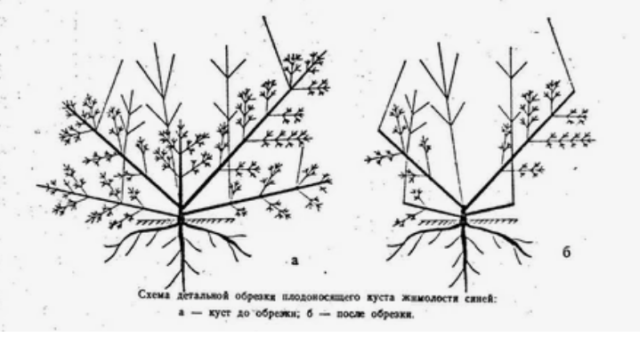
When pruning a bush in the spring, they observe not only the scheme, but also the rules of the sequence of actions performed
Correct pruning of honeysuckle bushes in spring occurs in the following order:
- First, dry and diseased shoots are removed. The branches are weak and with obvious damage next.
- The bush is freed from the branches lying on the ground. There will be no sense from them. They can not even be removed immediately, but used for reproduction. The branches are buried with earth in spring and watered abundantly. After rooting, they are cut off from the mother bush, transplanted to another place with a full-fledged seedling.
- After the release of the lower part of the crown, all the gnarled shoots growing inside the bush, tops are cut off.
At the end of the process, the growth is removed at the base of the trunk. The soil in the near-trunk circle is loosened, freed from weeds, mulched.
Seasoned gardener tips for pruning honeysuckle in the spring
Any procedure for caring for a plant has many nuances and secrets. Experienced gardeners are ready to share some of them.
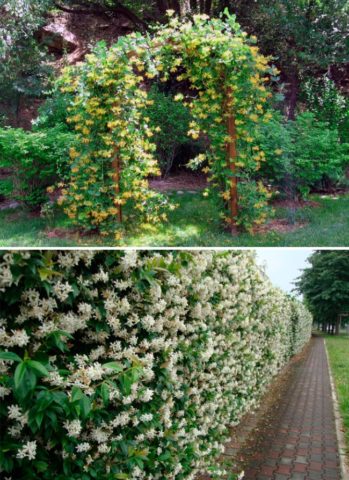
Blooming honeysuckle is beautiful in a hedge
After pruning in the spring, gardeners recommend feeding the shrub, since the procedure carried out has brought great stress to the plant. It is best to use organic. A compost bucket is added under each shrub. Of the minerals, phosphorus-potassium complexes are suitable, but the dosage must be observed.
Sour berries can be, even if pruning is done correctly in the spring. Perhaps the plant gets little sun in the first half of the day. It is advisable to plant the shrub so that it is in the sun before lunch, and in the shade after lunch.
Bitterness in berries, similarly, does not always appear from a violation of the pruning technology. Often the weather is to blame or the gardener did not water the plantings enough during the hot months. Sometimes bitterness is a varietal trait.
Conclusion
Pruning honeysuckle in spring is best for experienced gardeners. If you guess wrong with the timing, the plant can be severely damaged. Then the harvest will have to wait even longer. For beginner gardeners, it is optimal to do the procedure in the fall, and in the spring to carry out a sanitary examination.
